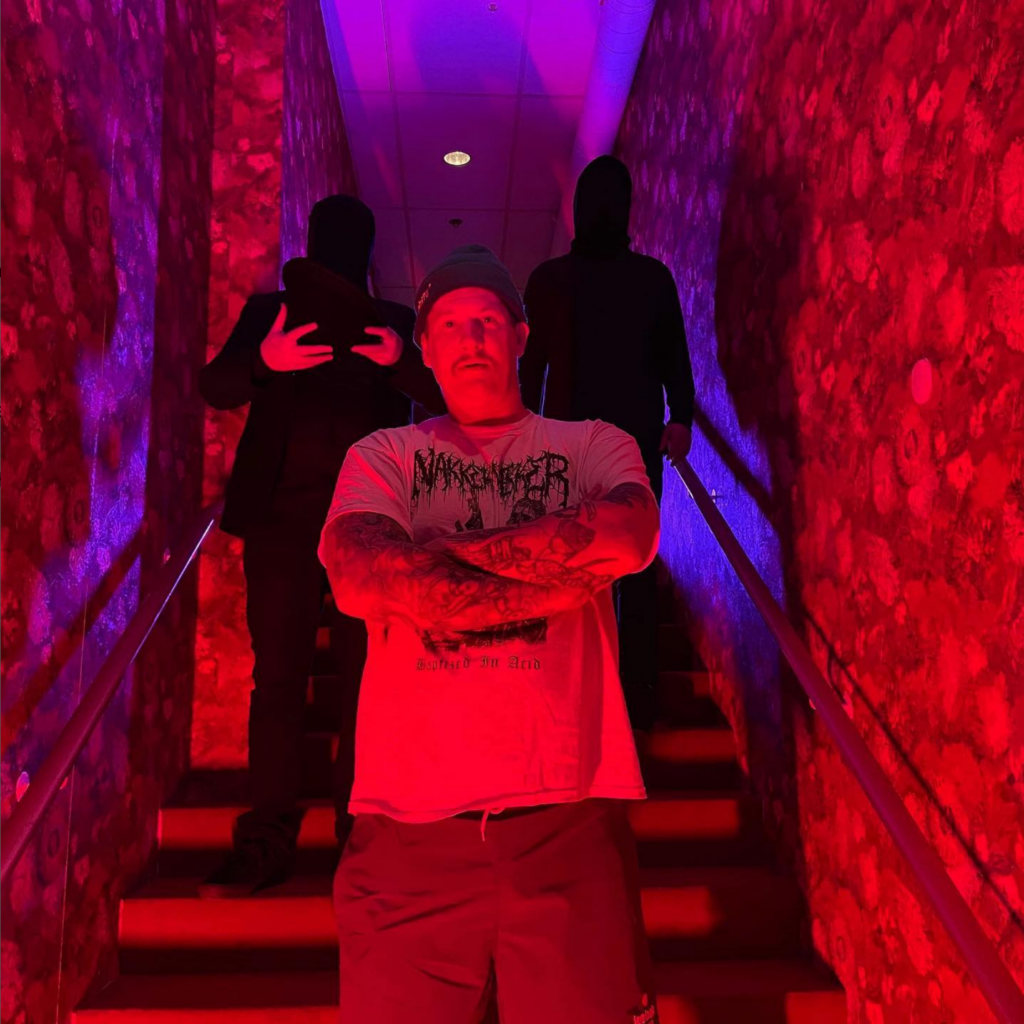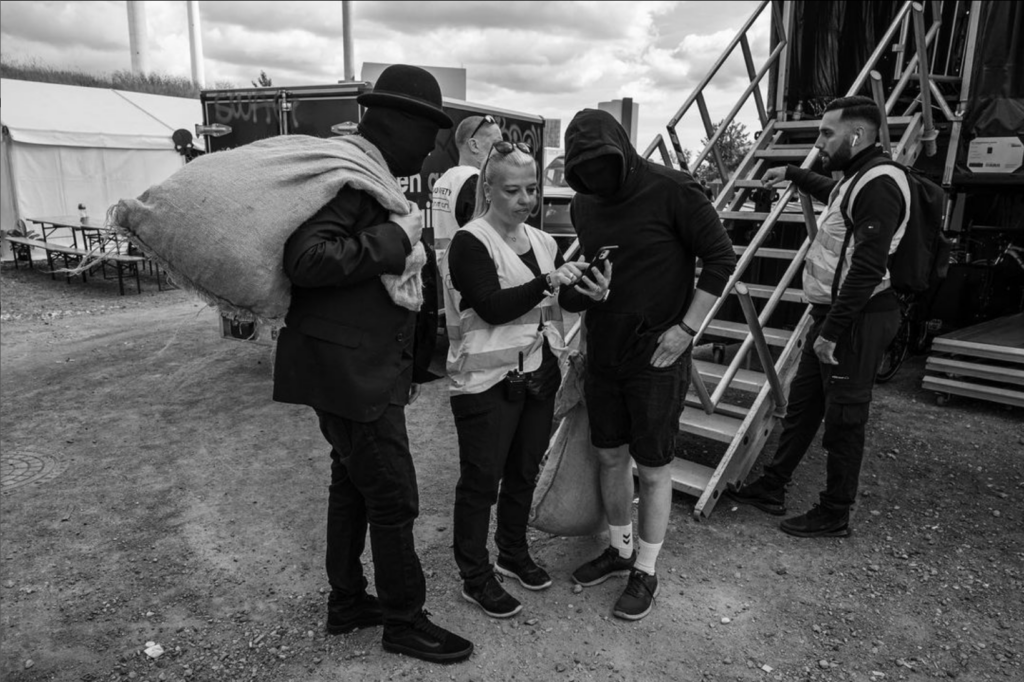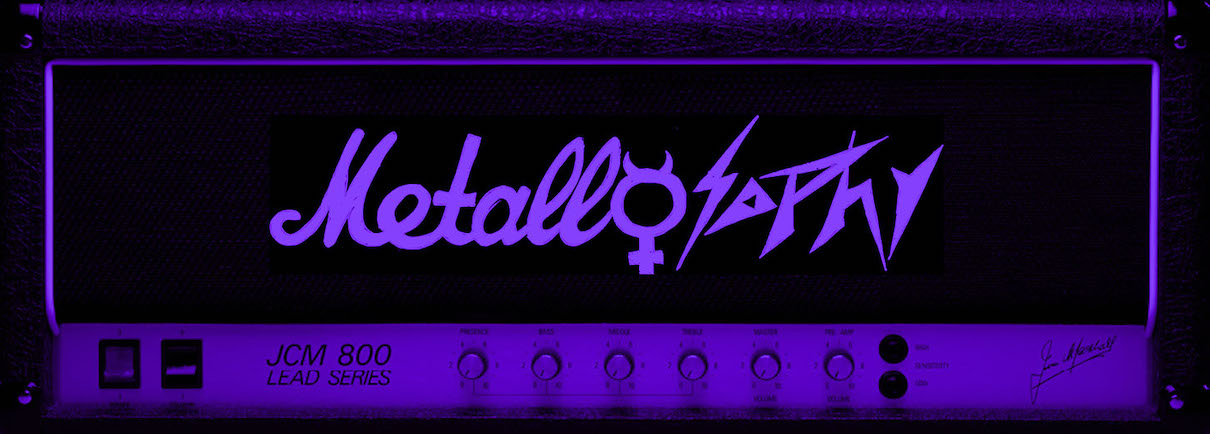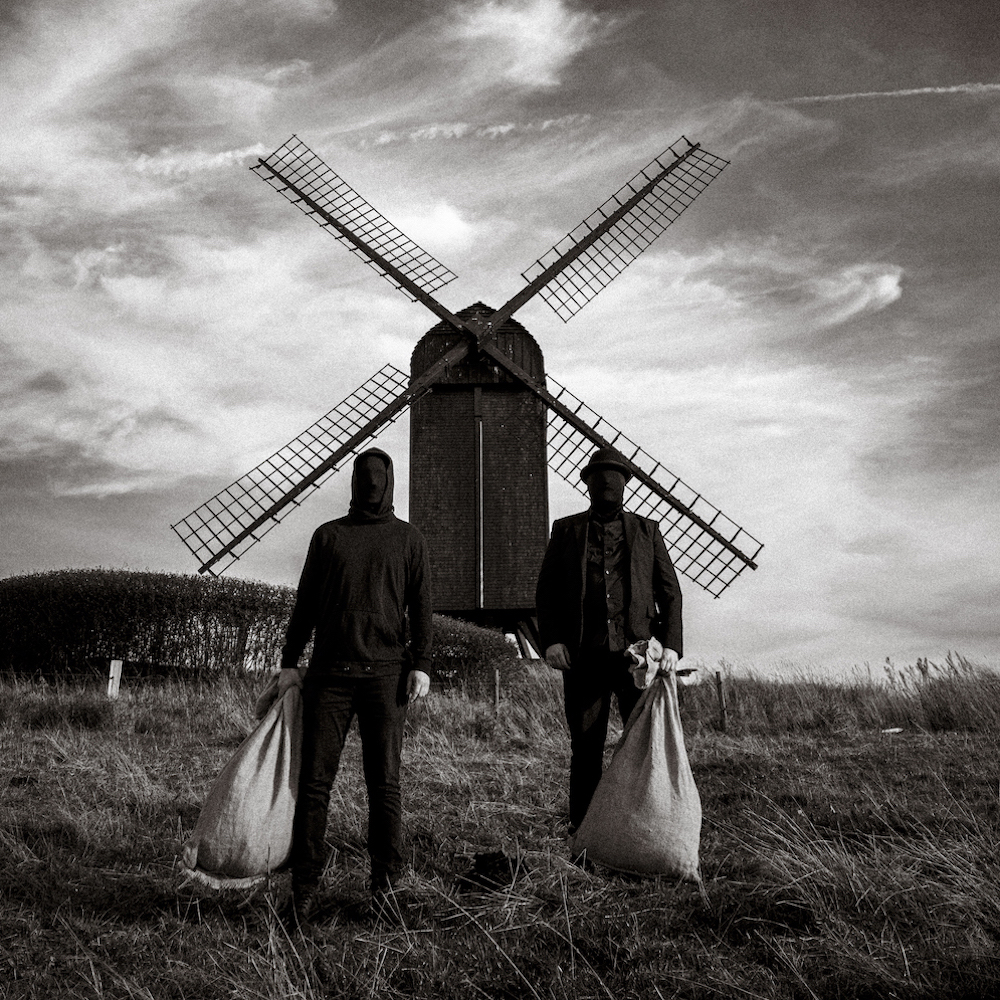Interview with Danish Nordic Black Metallers ANGSTSKRÍG |
The enigmatic, yet very philosophic duo ANGSTSKRÍG hail from Copenhagen and have brought us a very fresh and resounding brand of extreme metal which they call ‚Nordic Black Metal‘. On their sophomore album ‚Angstkrig‘, (‚Anxiety War‘, see the review here), a word play with the way a lot of people have misspelled their name, they talk about the impact of modern life on mental health, as it became visible in the wake of the Covid pandemic, and they deal with these topics in an even angrier manner as before. So it was obvious that we had to talk to them again, and discuss some more vital questions about neoliberalism, trve black metal curses and pushing stylistic boundaries…
Hi Guys, in our last interview (which you can find here…), we talked about your debut ‚Skyggespil‘ (‚Shadow Play‘), and who knows, maybe it will even become a tradition to do that with every new release?
That would be lovely.
Again, my first question is (even though I think I already know the answer…): is the world now ready to uncover what you are carrying around all the time in your heavy sacks? Or have you changed your habits to now rather drag colleagues around the city in coffins? This carrying of heavy stuff, and not being able to get rid of it, seems to me like an allegory of something, maybe of modern life – what do you say – should people learn to let go more easily, to relax and loose up a bit?
It’s true that everybody carries a burden – consciously or unconsciously – and we all need to figure out how to manage this in a constructive manner. And it’s also true that in our videos, we traded in the sacks for a coffin from which Michael (Jøden) appeared. So it seems like we took on a heavier burden.
In addition to all these burdens, starting a new band during a pandemic probably wasn’t that easy. Are you happy with the feedback you got on your debut ‘Skyggespil’ (for the review klick here)? You’ve now played your first live shows, too – what was the best show, and why? How was the experience of playing live like for you? Do you have a permanent live line-up that supports you? And what is planned in regards of live performances and festivals in 2023?
Most definitely. The initial response was – and still is overwhelmingly positive. But as expected, we’ve also bumped into a few gatekeepers of trve black metal, who’ve totally dismissed us and even wished for at least one of us to die. A bit harsh but it just proves that we did something right.
So far, we’ve only had our very first assembly at Copenhell last summer, which was a marvelous experience. It gave us a thirst for more. Regarding live line-up, we are working on several different scenarios or setups depending on the income/expenses ratio. We aim to be as pragmatic and adaptable as possible.
Now your sophomore album has already been released, but when I listen to ‚Angstkrig‘ (see review here), I have the impression that all the revolting and burning down of palaces like you proposed it in your debut didn’t help much, did it? You seem to be even more pissed off than before. What on earth has happened to you during the last two years? You seemed to have finished with humanity already back then… or do you still have hope for learning effects and further development?
Change takes time (while frustration builds), and, of course, we didn’t expect our debut album to single handedly change everything, since the problems we reflect on extend far beyond our little project. ‘Skyggespil’ was merely a small piece in a gigantic puzzle, which eventually will be solved. The same goes for ‘Angstkrig’. Yet, when zooming in on what our contemporary societies are doing to human beings, one can’t help but be pissed off. 40 years of obedience to the inhumane neoliberal political economy has brought us into the clusterfuck of crises we are currently experiencing – ecological, mental, democratic, philosophical, financial, technological and the list goes on. Nevertheless, we still have hopes for humanity, since the solutions are available.
Your concepts always deal with the complex and often contradictory reality of modern life. This time, throughout the difficult times of the pandemic, you have made inhuman psychological stress and the resulting increase of mental illnesses in modern life the main theme of the album. This is a very important topic that is also very close to my heart – not only as someone affected myself, but because only more publicity, openness towards this problem and more research into the causes of mental illness can improve things. How did you come to take up this issue?
We had several reasons. Personal experience was one of them. Another was witnessing friends’ mental breakdowns online, when having their self-image challenged during the pandemic. Even before the pandemic, we have advocated for making physical and mental illness equal. Yet, the main reason, as mentioned before, is the inhumane societies we have constructed over the past 40 years.
What do you see as the fundamental problems behind the worldwide increase in mental illnesses, burnouts and perhaps also the related increase in violent acts by even younger perpetrators as before? What do our societies need to do to help all these desperate people?
In short, modern thinking + neoliberalism = catastrophe. Modern thinking has detached us from the planet we inhabit, and neoliberalism has detached us from ourselves. A great start would be to replace neoliberalism with another political economy like neoliberalism replaced keynesianism back in the late 70s early 80s.
During the lockdowns, I enjoyed a lot that things were much quieter everywhere, life was going slower, and also at work demands and workload were quickly lowered. I had the impression that there was something like a „human scale“ again, and there was more time to do things which are also necessary for a wholesome life, besides work. Also the awful manners of going to the office even when you’re sick suddenly changed here in Germany. But when everything went back to so-called normality, it stressed me much more than the sometimes difficult and isolated time before, because I couldn’t or maybe even didn’t want to go back to this increased speed any more. Can you relate to this? Was it similar for you?
That was our experience as well. We were in the middle of recording ‘Angstkrig’, when everything opened up again all of a sudden. In an instant priorities changed and the stress and anxieties reappeared. This affected the vocal recording and lyric writing, especially, and it became somewhat of an uphill battle to get the record done. We tried, however, to use this apparent negative issue constructively – and succeeded.
You are from Denmark, are there initiatives in your country to break the stigma that still surrounds mental illnesses, and to achieve more attention for them among the population? Unfortunately, most people don’t know what to do when someone is in an acute mental health crisis… so I think there is a real need to get more publicity, like you did with your record! What do you think?
Yes, there are initiatives. They often seem to treat the symptom and not the cause, so to speak. But hey! It’s a start. As you touched upon earlier, openness has proved to be a great tool to alleviate any kind of taboo and/or stigma, so it would be idiotic not to promote this in the public realm.
Social media and the further spread of AI and its consequences also play a big role on ‚Angstkrig‘, ‚Luk Dine Øjne‘ deals with that. They are a double-edged sword, a curse and a blessing at the same time, and for many people in production, but also for artists, AI is a real, growing existential threat. How do you personally deal with it, do you have tips for a healthy approach to the growing influence of these technologies? What do you see as the biggest threat they impose?
We, human beings, are “hackable animals”. Every time we go on any social media we face a supercomputer that through algorithms knows us better than we know ourselves. So one of the best counter moves is to know yourself; to critically explore one’s individual circumstances e.g. by asking oneself the questions “why do I think, like I think?” and “why do I do, like I do?”. It’s our firm belief that a fundamental and critical understanding of oneself will result in a robustness that AI and any other type of persuasion will have a tough time breaking down.
The songs on the record have drastic titles like ‘Kaprede Sind’ (Hijacked Minds), ‘Ulægelige Sår’ (Incurable Wounds) or ‘Enegangens Overlæs’ (The Overload of walking alone), all very negative but important topics. ‚Uro‘ (Unrest) is even a song which tries to make a panic attack comprehensible. With this, you also personally venture outside your comfort zone, and are not afraid to make yourselves vulnerable. What is your motivation for this?
‘Uro’ is a brutally honest song both lyrically and in its composition. And it took some convincing to go down that creative path. Honestly, it was a learning experience. And it’s probably true that the titles and lyrics have a more negative ring to them. That’s exactly the beauty of (metal) music: metal music is a positive outlet for negative energies and emotions.
But now finally to the music! I was completely blown away by how much you have developed since the debut, how tight, multi-layered and at the same time varied and full of wacky ideas the new songs are, without losing your trademark style. What was the background for playing even more with genre boundaries, such as Jøden’s rap interlude or the increased use of a classic piano? What can we expect in this respect in the future?
To solidify our sound and explore even further was exactly our goal for ‘Angstkrig’. We are thrilled that it actually translates. We’ve always had a hard time understanding artists, who in the beginning are pushing the envelope and then 2 or 3 records into their career, start going increasingly more mainstream. It is a pretty common thing in the music industry. In our minds once you have established yourself and are commercially successful, you are in a perfect position to push the boundaries even further and take your fans and followers into more unchartered territories. Yet, that rarely happens.
Which is a pity… in contrast, your new songs are still extremely riff-based, but even more bass-heavy and groove-emphasizing than the debut, just listen to ‚Enegangens Overlæs‘. Is it true that the groove is simply in your blood, or what is it that makes this driving in the sound of many Danish bands?
It seems like it. Most of the Danish metal bands we are familiar with and grew up with are groovy. It’s hard to say where that tendency stems from. Nevertheless, it is indeed very prominent in our sound.

Again, there are some guests on board, like Jøden or Carl Mörner Ringström which do not exactly come from the metal scene. Obviously you have a lot of connections in the whole music world; what criteria do you use to choose your guests, what do they have to offer to be part of ANGSTSKRÍG?
The only criteria is that they have to be personal friends or acquaintances. And, of course, they should fit the initial idea for the song. But other than that they have complete creative freedom.
I like how you turned the apparently common misspelling of your band name into title and topic of the new record! Humour actually helps taking life easier, we already talked about it in our previous interview, that Danes grow up with humour and irony. Do you have a good joke for us, or a funny experience that has to do with the band you want to share?
No.
(Ed. – How could I even hope for?)
As usual, we’ll close with some synesthesia questions!
If stress, anxiety and depression had colours and shapes, which ones would describe them best, respectively?
Stress: flickering red and yellow and star shaped,
Anxiety: dark green and squared,
Depression: grey and round with blurry edges.
Which smells do remind you of really happy days, and why? And on the contrary, which ones always bring back bad memories?
Sulfur, because Iceland smells like sulfur, and Iceland is the most beautiful place on earth.. Mold, because mold in your house is bad for your health.
Please pick two of the new songs and at least two or more celebrities, who could represent them best in a respective, still to be filmed music video! Describe the plot. Why would they fit best to the songs?
‘Vishedens Ulidelige Lethed’ and ‘Midt i en Angstkrig’ + Adele and Billy Bob Thornton. They would wear masks and walk around in the beautiful Danish countryside with sacks over their shoulders. Later they will be transported via a church to the center of Copenhagen now dragging a coffin around. They enter an old theater and place the coffin on the stage. While they perform Romeo & Juliet, 50 cent jumps out of the coffin and performs with them before he suddenly disappears.
Of course we all hope you will live long & prosper, but in the end – which coffin or any other way of funeral would suit you best? What anthems should be played at this occasion?
It would be most appropriate, if we got the exact same funeral as Kim Jung Il – the over-the-top public crying especially. We think the world owes us that at least. Of course, they should play ‘What is love?’ on repeat in the background.
A festival is not only booking you, but wants you as the headliners and curators of all the bands before you on that day. There is no limit on the budget. What would the running order look like?
That’s an impossible task. But Weird Al Yankovic and Crazy Town should definitely be in there somewhere.

Bandinfo:
https://angstskrig.bandcamp.com/album/angstkrig
https://www.facebook.com/angstskrig/
https://www.instagram.com/angstskrigofficial/
Diskographie:
Skyggespil (LP, 2021) – zum Review
Angstkrig (LP, 2023) – zum Review
… here you’ll find more ANGSTSKRÍG on Metallosophy!

